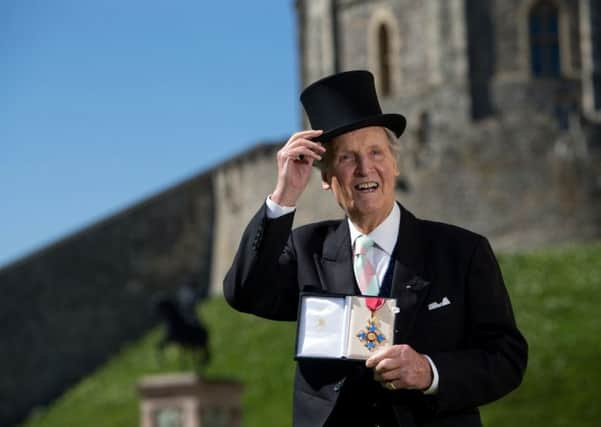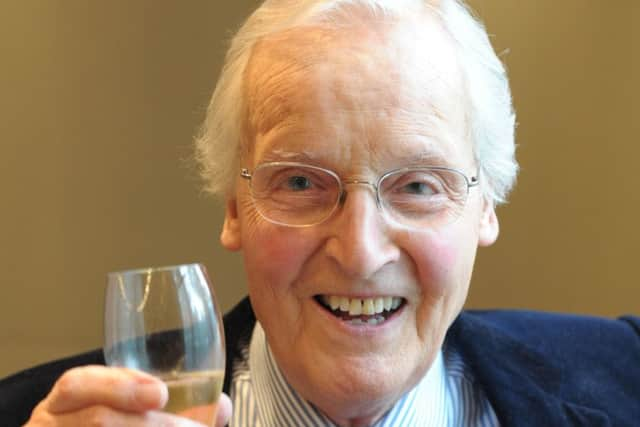Why I’m nostalgic for the golden radio age of Nicholas Parsons - Anthony Clavane


Today, when we finally leave the EU, many of my fellow citizens will be banging on about the mythical ‘Good Old Days’, a rose-tinted past when everyone behaved like characters in Downton Abbey.
This is not my kind of nostalgia.
Advertisement
Hide AdAdvertisement
Hide Ad

Now, don’t get me wrong. I have reached the age where it is compulsory to notice that things ain’t what they used to be.
I get particularly wistful when I see photos of old Leeds skylines, think about pre-digital tape recorders, see videos of rock stars smashing up guitars.
Nostalgia can be an air-brushing of the mind. It can suck away at the deep and jagged lines of an era’s divided and fraught history.
It can also, as some psychologists would argue, be a powerful tool in the battle against depressing thoughts. It can create optimism and inspire hope.
Advertisement
Hide AdAdvertisement
Hide AdIt was this kind of nostalgia I felt on hearing about the death of Nicholas Parsons earlier this week.
Parsons, who died at the grand old age of 96, had an astonishing 74-year career in show business. He was a talented actor, TV presenter and straight man to several comedians.
He will be mostly remembered as the genial host of Just a Minute.
Admittedly, he irritated me a great deal back in the 1970s when, clad in a bow-tie and glittery jacket – and often surrounded by scantily-dressed young women – he would introduce, “live from Norwich…the quiz of the week”.
Advertisement
Hide AdAdvertisement
Hide AdHis cheesy 14-year stint at Sale of the Century was surely the inspiration for Alan Partridge.
But from the moment he cheerfully announced “Welcome to Just a Minute” at the beginning of the Radio 4 panel show, all my worries, like The Minute Waltz, faded away.
For the next half-hour his affable charm would light up my evening and I would bask in the afterglow of such iconic phrases as “whoever is speaking when the whistle goes gains an extra point” and “benefit of the doubt”.
A panellist getting a “benefit of the doubt” from Parsons was the equivalent of a Great British Bake Off contestant receiving a Paul Hollywood handshake.
Advertisement
Hide AdAdvertisement
Hide AdI have been thinking a lot about that interesting saying these past few days. It seemed to sum up the essence of the show – and the essence of Old Nick. It was his way of giving new panellists a leg-up, allowing them to make mistakes, to break the rules for the sake of a good joke.
It was an acceptance of their nervousness at having to compete with greats like Kenneth Williams, Peter Jones and Paul Merton. According to The Free Dictionary, giving someone the benefit of the doubt is “to believe something good about them, rather than something bad, when you have the possibility of doing either.”
It is this generosity of spirit that, in an era of toxic public discourse, I am nostalgic for. It was reassuring to come across a presenter whose voice was a throwback to that brief, but golden, radio age sandwiched between the end of dinner-jacketed news-reading and the beginning of mid-Atlantic deejaying.
Parsons was an old-school charmer who encouraged up-and-coming young comics. His lack of ego was rare in such a narcissistic world.
Advertisement
Hide AdAdvertisement
Hide AdObituary: Nicholas Parsons, actor and broadcasterFrom the Williams era in the 1970s to the Merton era in the first two decades of the 20th century, his diffidence – and sense of what made for a good comic riff – enabled players to make fun of him.
He laughed at himself, especially when a new wave of edgy humourists stormed the comedy barricades in the 1980s, getting his retaliation in first.
Whether it was for wearing his trademark cravat, or exuding his prim and proper image, he was relentlessly baited, allowing himself to be the butt of a waspish Williams rant or a surreal slice of Merton’s mockery.
His voice was the soundtrack to my life, a reminder of a calmer, gentler world. As one obituarist noted, it was an “antidote to a coarsening Britain”.
Just a Minute without Parsons will be like Hamlet without the prince. I can say – without hesitation, repetition or deviation – that we shall not see his like again.